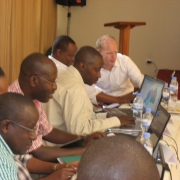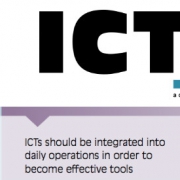Africa’s Agribusiness Dream: How can ICTs Help?
Earlier this month, the Corporate Council on Africa (CCA) held its 8th Biennial US-Africa Business Summit in Washington DC. One of the key focus areas at the summit was the agribusiness sector in Africa with sessions and workshops covering topics such as “Winning for Farmer Entrepreneurs and Investors”; “Partnering to Build an Integrated Agribusiness Sector”; “Financing a Dynamic African Agribusiness Sector”; “Removing Barriers to Create Opportunities in Regional and Global Trade”; and “Leveraging Development Assistance to Support Private Enterprise”. Stories and experiences from a number of participants who are already in the market in certain parts of Africa clearly show the increasing interest in changing Africa’s agricultural sector from an “AID Recipient” to a “BUSINESS Partner”. This of course, calls for a number of changes including the perception of agriculture by the smallholder farmers that need to be undertaken in Africa’s bid to revamp its agricultural sector.
As an agricultural information specialist, I followed with keen interest the proceedings at the said US-Africa Business Summit with special concern for agricultural development in the continent. What I saw and heard at the summit during the discussions on issues such as farmer entrepreneurship, partnership, financing, removing barriers for regional trade, and leveraging development assistance within the agricultural sector, seemed to be missing a major component – information and communication technologies (ICTs). In fact, one would have expected most of these discussions to have some element of ICTs as enabler or catalyst for the entire agricultural value chain. Especially given the Information Economy Report 2011: ICTs as an Enabler for Private Sector Development (PSD), published by the United Nations Conference on Trade and Development (UNCTAD) that pointed out clearly that the potential of leveraging ICTs to develop the private sector is far from fully exploited.
Access to information by smallholder farmers is key for producing high quality products to meet market specifications both locally and international. ICTs are key in gathering and delivering timely and accurate agricultural information for farmers to be able to do just that. Smallholder farmers are currently using ICTs in pre-production and production activities across the world that the business sector needs to exploit and leverage upon in Africa. This is being achieved through the reformed and modernized Agricultural Advisory Service (AAS), which connects local farmers to research, market, and policy. Popular applications that should interest companies and institutions interested in Africa’s agribusiness include Grameen AppLab Community Knowledge Workers; Farmer Voice Radio Project; M-Powering Farmers, and other radio services across the developing world.
Farmers also lack access to credit for their production and there are a host of financial services using the new ICTs to facilitate the flow of financial services to smallholder farmers in the developing world. Mobile payments, mobile money, or mobile banking applications are being used to make financial transactions more accessible, faster, and safer for rural farmers. These services also link farmers to financial services and make it easier for them to save money obtained from their farm activities for other social services. These are great opportunities for entrepreneurs and the business community interested in investing in Africa’s agribusiness to explore. Examples include the M-PESA currently operating in countries like Kenya and Tanzania; Mobile Money in Ghana, Uganda, Zambia and others.
Also worth exploring is ICTs for market. When one talks about business, the first thing that comes to mind is “market” and markets affect smallholder agriculture production from inputs supply such as seed, agrochemicals, farm machinery to the outputs or products delivery to the final consumer either in the local, regional or international market. Access to market information helps farmers find out about market prices, make decisions regarding when to harvest, how to negotiate with intermediaries, etc. ICTs models such as esoko in a number of Sub-Saharan Africa countries, e-Choupal and Reuters Market Light in India, Manobi in Senegal, Infotrade in Uganda, and Zambian National Farmers Union MIS are just the tip of the iceberg.
The traditional agricultural extension service, which has been a public platform over the decades, is undergoing a lot of reforms to create an enabling environment for the private sector to heavily invest in the ICTs sector. With the new models of agricultural extension reforms such as decentralization, privatization, commercialization, pluralism, and partnerships, there should not be any barrier for the private sector in using ICTs to enhance their agribusiness in Africa. American and European businessmen and companies interested in Africa’s agriculture should not make mistake by ignoring the importance of “information” in their business – ICTs can help when recognized and incorporated into the agribusiness plan!








































